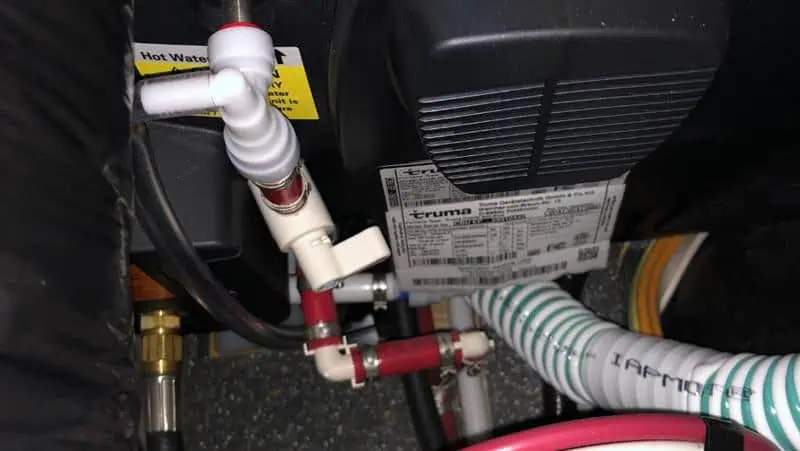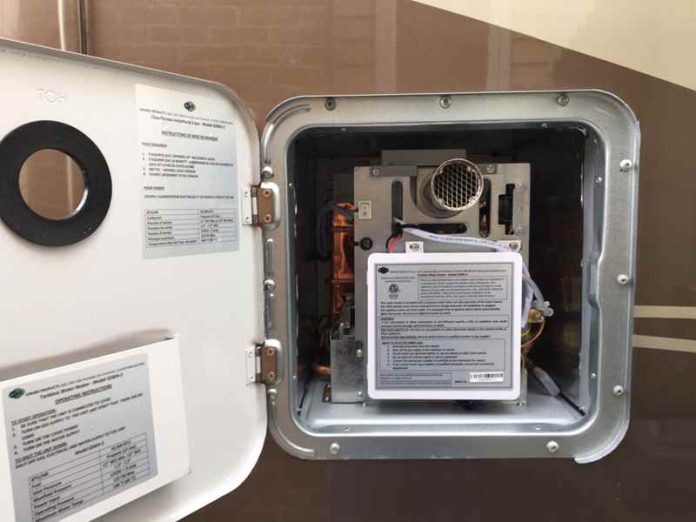Introduction
Imagine the freedom of hitting the road in your recreational vehicle (RV) yet still enjoying all the comforts of modern living, such as a hot shower at the end of a long day of adventure. The rise of tankless water heaters has transformed this aspect of RV life for many, offering a level of convenience and efficiency that traditional water heaters struggle to match. In this introduction, we’ll learn how to convert an RV water heater to tankless hot water and why an increasing number of RV enthusiasts are switching to tankless systems.
The Growing Popularity of Tankless Systems in RVs

There’s a growing trend in the RV community: the switch from conventional water heaters to tankless models. This movement is driven by the desire for more efficient use of space and energy and the need for constant access to hot water. According to recent surveys, more RV owners are opting for upgrades that enhance their travel experience and reduce maintenance hassles. Tankless water heaters are at the forefront of these upgrades, thanks to their ability to provide instant hot water on demand without the limitations of a storage tank.
Advantages of Tankless Water Heater Systems
Why are tankless water heaters such a game-changer in the world of RVs? For starters, they offer benefits in terms of convenience and efficiency. These systems heat water directly without the use of a storage tank, which means you’re not waiting for a whole tank to warm up before you can take a shower.
They are also more compact than traditional water heaters, freeing up precious space in your RV for other amenities or storage. For savings on energy consumption, tankless heaters only operate when you turn the tap on, which can lead to energy savings as you’re not heating and re-heating water that sits in a tank.
Preparing for the Conversion
We’ve prepared a comprehensive guide on how to convert an RV water heater to tankless systems in order to help you through the process.
Understanding How to Convert an RV Water Heater to a Tankless
You might be curious about how the comfort of continuous hot water can be a part of your journey. Traditional RV water heaters are a staple for such comfort, but what exactly powers these behind-the-scenes heroes, and how do they operate?
Traditional RV water heaters usually work on a simple principle similar to residential units. They typically come in two varieties: those that run on propane and those that use electricity. Some RV water heaters have the option of running on either fuel source. These water heaters have a storage tank where water is heated and kept ready for use. The capacity of these tanks usually ranges from 6 to 10 gallons, though larger RVs might have bigger tanks.
When a tap in the RV is turned on, the water flows from the tank through the plumbing to the outlet. The heating element (in electric models) or gas burner (in propane models) kicks in when the water temperature falls below a set threshold, ensuring the water in the tank remains at a consistent temperature. However, once the hot water in the tank runs out, you must wait for the tank to refill and the new supply of water to heat up, which can be inconvenient and time-consuming, especially if multiple people need to shower back-to-back.
Are you ready to embrace the tankless revolution in your RV? We’ve prepared a comprehensive guide on how to convert an RV water heater to a tankless system in order to help you through the process. Whether you’re a seasoned DIYer or new to the world of RV modifications, our guide will break down everything you need to know. Covering everything from the tools and materials required to the actual installation steps, gear up for an upgrade that promises to elevate your RV experience.
In contrast, tankless water heaters eliminate this waiting time by heating water directly as it flows through the unit. Can you see how it might be beneficial for you to know how to convert an RV water heater to tankless?
Limitations of Conventional RV Water Heaters
The traditional hot water setup comes with limitations. Space is a luxury in an RV, and the tank occupies a significant amount of it. Moreover, a finite amount of hot water is available before you need to wait for the tank to refill and reheat, which is not ideal for back-to-back showers or extensive use. This is part of why RV owners should learn how to convert an RV water heater to a tankless setup.
Energy efficiency is another concern; the tank must keep water hot at all times, thus continuously consuming energy. This continuous energy expenditure can significantly impact your travel budget and the overall efficiency of your RV’s energy use.
Furthermore, the insulation around the tank, while designed to minimize heat loss, is not always perfectly efficient. Some heat will inevitably escape, meaning that the system must work harder and consume more energy to maintain the set temperature. This inefficiency is more pronounced in colder climates where the difference between the outside temperature and the desired water temperature increases, thus requiring even more energy to maintain heat levels.
The presence of a storage tank also introduces another limitation—water stagnation. If the RV is not used regularly, water left standing in the tank can become stale or, in some cases, contaminated. This scenario necessitates flushing the system before use, adding another task to your setup process after a period of inactivity.

Advancements in RV Water Heating: The Rise of Tankless Systems
In response to these limitations, many RV owners and manufacturers have begun to shift towards tankless water heaters. These systems, also known as on-demand water heaters, heat water directly without using a storage tank.
Why Consider Transitioning to a Tankless System?
So why make the switch to a tankless system? For starters, tankless water heaters heat water directly as it flows through the device, which means no storage tank is needed, saving precious space in your RV. This “on-demand” feature also means you get hot water when you need it, for as long as you need it, without the waiting periods associated with reheating a traditional tank.
Additionally, since water is heated only when needed, you could see a reduction in energy consumption — a win for both your wallet and the environment. Transitioning to a tankless system could revolutionize the way you experience travel in your RV, merging convenience with efficiency in a package that’s increasingly becoming the norm in the nomadic lifestyle.
armed with the know how to convert an RV water heater to tankless setups, it’s time to take action
Why You Should Learn How to Convert an RV Water Heater to Tankless Heating System
Imagine never having to wait for the water to heat up before taking a shower in your RV. Let’s learn about specific benefits that make going tankless an appealing option for RV enthusiasts. We will focus on three key areas: endless hot water supply, energy efficiency, and space conservation.
Endless Hot Water Supply
Traditional water heaters with tanks often run out of hot water after extended use, which can be inconvenient, especially for families or groups. Tankless systems, by heating water on demand, ensure that you can have a continuous supply of hot water. This feature is particularly beneficial in scenarios where multiple people need to shower back-to-back or when there’s a need for simultaneous usage of hot water for washing dishes while someone takes a shower. The convenience of having access to hot water anytime without the wait offers a significant improvement in the overall RVing experience.
Energy Efficiency
Tankless water heaters are generally more energy-efficient than their traditional counterparts. In traditional systems, the stored water needs to be kept at a constant temperature, which requires periodic reheating. This leads to continuous energy consumption even when hot water isn’t being used. In contrast, tankless systems eliminate this “standby loss” because water is heated only upon demand. This reduction in energy use not only helps in saving on utility bills but also aligns with the growing trend towards green, sustainable living practices.
On-Demand Hot Water and Space Savings
One of the most alluring advantages of a tankless system is the provision of hot water on demand. Unlike traditional water heaters that store a finite amount of hot water, tankless systems heat the water as it flows through the device. This means you can enjoy a continuous supply of hot water without worrying about the last person in line ending up with a cold shower. Moreover, by eliminating the bulky storage tank, you reclaim precious space within your RV, which can be used for storage or simply to enjoy a more open living area.

Addressing Concerns and Misconceptions
Despite their growing popularity, some RV owners may still hesitate to switch to a tankless system due to concerns about complexity and cost. It’s important to dispel these misconceptions. Modern tankless systems have become increasingly user-friendly and can be a cost-effective solution in the long run. While the initial investment might be higher than traditional water heaters, the energy savings over time can offset this cost.
How to Convert an RV Water Heater to Tankless
So, you’re convinced that a tankless water heater is the best option for your RV. What’s next? The next step is knowing how to convert an RV water heater to tankless. Successfully converting from a traditional water heater requires precise steps and the right tools and materials.
Tools and Materials Needed
Before diving into the conversion process, it’s essential to gather all the necessary tools and materials. Here’s what you’ll need:
- Adjustable wrenches
- Pipe wrench
- Teflon tape
- Screwdrivers (Phillips and flathead)
- Utility knife
- Wire cutters and strippers
- Voltage tester
- Drill and drill bits
- Reciprocating saw (if cutting is required)
- Tankless water heater unit designed for RV use
- Mounting hardware (usually provided with the unit)
- Replacement plumbing fittings as needed
- Electrical connectors and wiring supplies
- Sealant suitable for water applications
Now that you have your toolkit ready, let’s remove your old water heater.
Removing the Existing Water Heater
First, ensure that all power and water supply lines to your current water heater are turned off. It’s crucial for safety to double-check this with your voltage tester. Then, drain the existing water heater tank and disconnect the gas line if applicable.
Next, unscrew and remove the mounting brackets that hold the water heater in place. Carefully disconnect the water inlet and outlet connections using your adjustable wrenches. Be prepared for some residual water to spill out. With all connections free, you can now remove the old water heater unit from its nook.
Installing the Tankless System
With the old unit out, it’s time to fit your new tankless water heater. Place the new unit into the opening where the old heater was located. Use the mounting hardware to secure it in place, ensuring it’s snug and stable.
Connect the water inlet and outlet, applying Teflon tape to the threads for a watertight seal. Electrical connections should be handled with care, following the manufacturer’s instructions closely. If you need to extend or alter the existing electrical wiring, use proper connectors and ensure all connections are insulated and secured away from any water sources.
Finally, turn the power and water back on and test your new tankless system. Check for leaks or electrical issues and ensure hot water flows when you demand it.
Tips and Tricks for a Smooth Conversion
A few tips can help ensure your conversion process is as smooth as possible:
- Measure twice before cutting or drilling; an error here can be challenging to repair.
- Take photos of your old setup before disassembly, which will serve as a handy reference.
- When dealing with electrical components, always prioritize safety by ensuring the power is off and double-checking with a voltage tester.
- If you’re not confident with plumbing or electrical work, consider enlisting professional help to avoid costly mistakes.
- Review the warranty and support options for your tankless system. Knowing your options is good in case you run into issues down the line.
By following these detailed steps and keeping our tips in mind, you’ll be well on your way to enjoying endless hot water in your RV with a new tankless system. Remember, while the process requires attention to detail and care, the result is a more efficient and enjoyable travel experience.

Conclusion and Call-to-Action
Now that you know how to convert an RV water heater to a tankless system, it’s become clear that such an upgrade is more than just a modern convenience. It’s a leap towards a more efficient and enjoyable travel experience. Let’s take a moment to recap the highlights and encourage you to embark on this rewarding DIY project.
Embracing the Benefits of Tankless Water Heaters
To summarize, shifting to a tankless water heater in your RV means saying goodbye to the wait times for hot water and hello to a continuous supply. This is done while conserving valuable space and energy. The benefits are many, from the practicality of on-demand hot water that never runs out to the long-term savings in fuel and maintenance costs. Not only does it contribute to a more sustainable way of living on the road, but it also increases the comfort and convenience of your mobile home-away-from-home.
Take the Leap with Confidence
Now that you know how to convert an RV water heater to a tankless setup, it’s time to take action. Remember, the transition may seem daunting, but it is achievable with careful planning and a bit of elbow grease. Have confidence in your abilities as a DIY enthusiast and trust in the steps laid out before you. With the right tools and a patient approach, you’re well on your way to enjoying the fruits of your labor.
Join the Community of Trailblazers
We invite you to not just witness this revolution in RV living but also become an active participant. Share your successes and challenges, ask questions, and connect with others who have embarked on the same journey. Your experiences are invaluable, and your stories can inspire and guide fellow travelers looking to make similar upgrades. By sharing, you help build a community of informed and passionate RV enthusiasts committed to improving life on the road.





